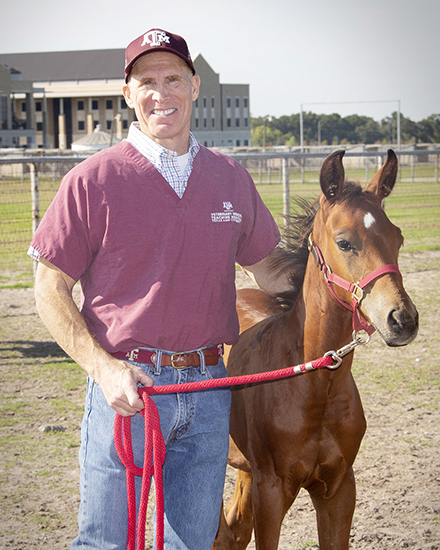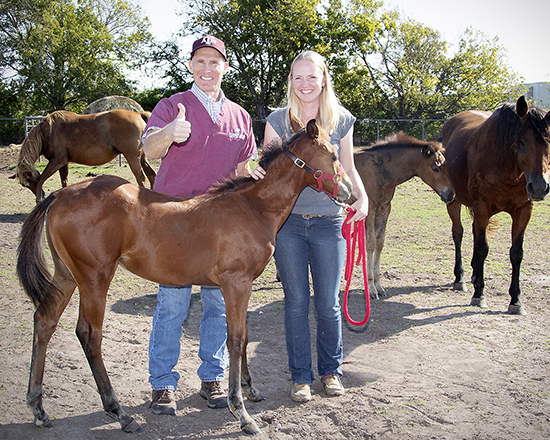CVM Researcher Fights Antibiotic Resistance, Improves Foal Health
Story by Margaret Preigh, CVMBS Communications

Dr. Noah Cohen, the Patsy Link Chair in Equine Research at the Texas A&M College of Veterinary Medicine & Biomedical Sciences (CVM), has identified an alternative treatment for foal pneumonia that avoids the use of often over-prescribed antibiotics.
In research funded by the Morris Animal Foundation, Cohen and collaborators found that gallium maltolate (GaM), a metal-based compound with antimicrobial and anti-inflammatory properties, resolved subclinical pneumonia (i.e., pneumonia identified in foals that did not have clinical signs, such as fever, coughing, a depressed attitude, etc.) without increasing the number or diversity of antibiotic-resistant bacteria in the foals’ fecal samples.
Antibiotic resistance is a pressing issue in today’s world. Overuse and incorrect use of antibiotics have increased the prevalence and diversity of bacteria that are resistant to antibiotic medications. This creates “superbugs” that doctors have no way of combatting, opening vulnerabilities in human health, the health of our animals, and the health of our food system.
Foal pneumonia is one of the leading causes of death and disease in foals and has no licensed vaccine. It is often caused by the bacteria Rhodococcus equi (R. equi), which occur naturally in soil.
Pneumonia caused by R. equi is insidious, meaning it progresses gradually and is well established by the time symptoms appear, so many farms screen foals using chest ultrasound examinations to find foals that are developing pneumonia before they show clinical signs of disease.
Veterinarians then treat the foals that have chest lesions indicating pneumonia. However, because many of these foals that have chest lesions seen on ultrasound won’t go on to develop pneumonia, a large proportion of foals get treated with antibiotics needlessly.
“While that treatment strategy saves lives in the short term, it’s really driving this resistance problem because, for every one foal that needs treatment, several foals that don’t need treatment wind up getting antibiotics,” Cohen said.
In this study, published in the journal Scientific Reports, researchers from Texas A&M and the University of Georgia investigated the use of GaM as an alternative to a macrolide antibiotic plus rifampin (MaR), an antibiotic combination that is the standard treatment for R. equi foal pneumonia.
Foals with signs of subclinical pneumonia were given either GaM or MaR for two weeks.

After two weeks, foals treated with MaR displayed an increase in their number and diversity of antibiotic-resistant bacteria in their fecal samples. Alarmingly, many of these bacteria were resistant to multiple drugs and antibiotics.
In foals treated with GaM, however, bacteria collected from fecal samples showed no change in the number or diversity of antibiotic-resistant bacteria. This finding suggests that while treatment with MaR promotes the abundance of antibiotic resistant bacteria, treatment with GaM did not affect the amount of these harmful germs.
This is important because horses are often kept in groups; therefore, the fecal bacteria of one animal may infect or colonize another healthy foal living on the same soil.
Another concern of using MaR in the treatment of foal pneumonia is that the excrement of horses taking this medication may contain traces of unabsorbed antibiotic. This study showed that antibiotic entering soil will increase selection for bacteria that are resistant in the soil.
Researchers hope to next test the effectiveness of GaM on foals that are clinically infected with R. equi.
This study comes at a vital time, as bacteria evolve faster than scientists develop new drugs. Antibiotic alternatives, such as the substance investigated by Cohen and his colleagues, are integral to ensuring the future of our food systems, our animal friends, and our own health.
“The World Health Organization has identified antimicrobial resistance as a top threat to human health,” Cohen said. “There is an urgent need in human and veterinary medicine to identify alternative antimicrobials because bacteria can evolve resistance so rapidly, and often to multiple classes of drugs.”
###
For more information about the Texas A&M College of Veterinary Medicine & Biomedical Sciences, please visit our website at vetmed.tamu.edu or join us on Facebook, Instagram, and Twitter.
Contact Information: Jennifer Gauntt, Director of CVM Communications, Texas A&M College of Veterinary Medicine & Biomedical Science; jgauntt@cvm.tamu.edu; 979-862-4216


